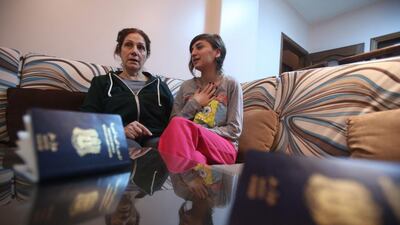DAMASCUS // After nearly 24 hours of exhausting travel from war-ravaged Syria, the Abu Assaleh family arrived in Philadelphia, brimming with excitement to begin their new life in the United States.
The Christian family of eight had waited more than 13 years since first applying for the immigration visas now stamped neatly into their Syrian passports.
On Friday, they travelled from Damascus to Beirut, then Amman and on to Doha, before finally landing at Philadelphia International Airport. But as they shuffled through the airport, an immigration official approached them and asked to see the family’s passports.
“They took us into a special hallway and I started to get nervous,” said Josephine Abu Assaleh, 60, who had travelled to the US with her husband Bassam, his brother Hassaan and Hassaan’s wife and four children. “The officer came back and told us that our visas had been cancelled and we wouldn’t be allowed to enter the United States.”
After more than 20 hours of travel, hopeful anticipation turned to shock and devastation, as the family was informed they would be sent back to Syria after US president Donald Trump’s new restrictions on immigration.
“I told the officer ‘You’re kidding, right?’, and he responded, ‘Do I look like I’m kidding?’,” Josephine said.
Mr Trump’s executive order, signed last Friday, bars entry to the US for travellers from seven predominantly Muslim countries – Iran, Iraq, Libya, Somalia, Sudan, Syria and Yemen – for 90 days.
It also suspends the arrival of all refugees for at least 120 days, and Syrian refugees indefinitely.
Now back in their home in Tijarah district, Damascus, Josephine gestured to nearly 20 suitcases scattered across the house. She spent days shopping for gifts for friends in the US and now cannot bring herself to unpack them.
The family had been applying since 2013 to emigrate to the US. Their visas were finally issued in October.
“It was such a happy feeling to get a visa to America, considering so many countries are fighting us and won’t give us visas,” said Josphine’s husband, Bassam, 62. But the visa in his passport now has a thin blue line through it to show it is cancelled.
“We travelled on January 27 and arrived in Philadelphia where we found, to our surprise, that a decision had been issued to cancel our visas while we were in the air. We thought it was something personal against us.”
After receiving their immigration visas, Bassam’s brother, Hassaan, and his sister-in-law sold their home and their car in Damascus. Their 20-year-old daughter, Sara, began imagining her new life.
“I said goodbye to my friends in school, my neighbours, and all the places that I love,” she said. “It was a beautiful dream that started turning into reality. I started to read a lot about America, the university that I wanted to enrol in and the places I would visit as soon as I arrived.”
Most of all, she was excited at the prospect of being reunited with her brother Tufiq, who left Syria three years ago to study in the US and had been waiting impatiently in the arrivals lounge at Philadelphia.
“The most difficult moments were in the airport, when the police wouldn’t let my mother go out to meet my brother, whom she hadn’t seen in three years,” Sara said. “There were just a few metres between them and my mother collapsed in tears because she wanted to wrap my brother in her arms but couldn’t.”
After pleading fruitlessly with airport officials, Sara’s family was escorted to a departing aircraft without seeing Tufiq.
“I thought my father was going to have a heart attack. We couldn’t eat or sleep on the plane ride back,” Sara said. “We weren’t allowed to have a lawyer or a translator. They robbed us of our simplest rights in a nation that everyone says is the country of laws and human rights.”
* Agence France-Presse

